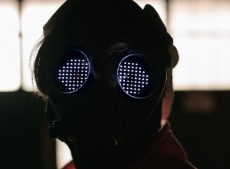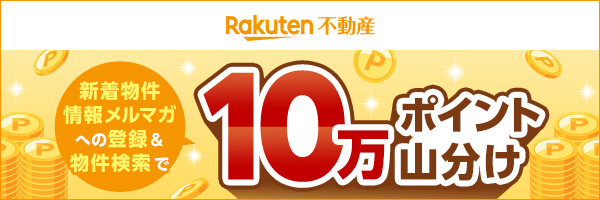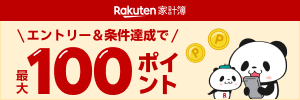「ビートと、ラッパーがそのエネルギーをビートにのせて伝えているだけの方が、ポップのショーみたいに華やかに作り込まれた音楽より魅力的に感じる。パフォーマンスやシンガー・ソングライターの面にはあまり力を入れていないような音楽。そういう感性で理解されるような曲を自分でも作れるのかやってみたかった」Car Seat Headrest /Interview with Car Seat Headrest about『Making A Door Less Open』
NeoL / 2020年5月1日 17時0分
「ビートと、ラッパーがそのエネルギーをビートにのせて伝えているだけの方が、ポップのショーみたいに華やかに作り込まれた音楽より魅力的に感じる。パフォーマンスやシンガー・ソングライターの面にはあまり力を入れていないような音楽。そういう感性で理解されるような曲を自分でも作れるのかやってみたかった」Car Seat Headrest /Interview with Car Seat Headrest about『Making A Door Less Open』
この10年で頭角を現したアメリカのインディ・ロック・バンドのなかで、もっとも賞賛に値する一組――そういって過言ではないだろう。現在はシアトルを拠点に活動する4人組、カー・シート・ヘッドレスト。かれらが2016年に発表した『Teens of Denial』を2010年代のベスト・アルバムにリストアップしたPitchforkは、その評でフロントマンのウィル・トレドについてこう称えている。「かれは驚くほどの想像力に富み、ダイナミックなロック・ソングを作ることができる洞察力に優れたシンガー・ソングライターとして群を抜いていることを証明している」。ペイヴメントやモデスト・マウス、デス・キャブ・フォー・キューティーも引き合いに出される90年代のUSインディの系譜を受け継いだギター・ロック・サウンド。そして、孤独や不安、焦燥感といった青年期特有の複雑な感情や人生に訪れる出来事を真に迫った心理描写で言葉にした歌詞。この度リリースされる通算12作目のフル・アルバム『Making a Door Less Open』は、初めての試みとなる“コラボレーション”というかたちで制作された作品になる。今年でデビュー10年となるかれらにとって、今作は節目と変化を意味する作品といえるだろう。(→ in English)
ーーまず、新型コロナウィルスの影響で大変な状況のなかインタビューを受けていただきありがとうございます。最近はどのように過ごしていますか。
CSH「なるべく忙しくするようにしているよ。すぐに別のプロジェクトを始めて、ルームメイトと一緒に音楽を作っているからその素材をまとめたりしている。リビングルームには読みかけの本が山積みになっているから、それを読むのに時間を使うようにして。あとは、思い浮かんだことをその都度メモに書き留めるということをしている。時間や曜日の感覚がなくなって、毎日何をしたのかを忘れやすくなっている感じがするから、自分の考えを記録したいと思って。ランダムに浮かび上がるアイデアや、頭のなかにある考えを書き留めておくようにしている。これは新しい試みなんだけど」
ーー奇しくもこのような状況下でのリリースとなったニュー・アルバム『Making a Door Less Open』ですが、純然たるオリジナル・アルバムとしては『Teens of Denial』以来4年ぶり(※2年前の前作『Twin Fantasy (Face to Face)』は過去の楽曲をリワークした内容)の作品になります。
CSH「リリースがもうすぐで嬉しい。苦労も乗り越えて、アルバムをようやく完成させて、提出することができたから。営業担当の人が今日、ヴァイナルを受け取ったみたいだから、もうすぐ出荷の準備も整う。だから楽しみだよ。これから曲も徐々に公開される予定だし、より多くの人々がアルバムの音楽を聴いて話題にしてくれたら嬉しい。今後の展開が楽しみだね」
ーー当然ですが、今作を制作している時点ではこのような状況になるとは想像もしてなかったと思います。ただ結果として、こうしたタイミングでリリースされることになったからこそ、曲の歌詞やメッセージが聴き手に深く伝わったり、別の意味を帯びて受け止められたりする部分もあるかもしれない。そう考えるところもありますか。
CSH「無回答」
ーーこれまでのCSHの作品では、青年期特有の複雑な感情や人生に訪れるさまざまな出来事がドラマチックなストーリーテリングによって描かれてきました。対して今回のアルバムでは、戦争や遺体安置所、流される血といった不吉な描写を通じて、苦悩や救い、死、あるいは後悔の念といったものがよりシリアスに綴られている印象を受けました。こうした変化はどのようにして生まれたのでしょうか。
CSH「僕の音楽には昔からダークな一面というのはあったと思う。初期の作品でも死についてはたくさん書いていたけれど、歳を取るに連れて、死というものがさらに現実味を帯びてきた。だから最近はもっと死について真剣に考えるようになった。現時点で僕は、まだ大勢の人より若いけれど、本質的にはもう若いとはいえないし、『それをやるには若すぎる』と人からいわれるような歳でもない。他の大人と同じことをする普通の人間という段階にきている。そのことを受け止めるというのがこのアルバムの大部分を占めているんだ」
ーー“Hymn”では、「諦めれば、救われるのか?/僕の人生は救われるのか?/その後には何が来るのか?」と切実に問いかける歌詞が印象的です。この曲はどのような背景から生まれたのでしょうか。
CSH「アルバムのなかでは最も短時間でできた曲だった。僕たちはスタジオにいて、僕はストレスを感じていた。アルバムの素材はほぼ揃っていたけれど、まだ足りないパーツがあって、それを埋める作業をしていたけれどあまり成果が出ていなくて。そのストレスが増幅してパニックになって、その状況と感情をもとにこの曲を作ったんだ。一日くらいででき上がったかな。当時、僕が感じていた切実な気持ちを表現できたと思う」
ーー「休息が必要だ/真っ当な生活が必要だ」と救いを求めるような“Famous”も胸を打ちます。
CSH「この曲は比較的、長い期間をかけて曲のパーツをまとめていってでき上がった。でも同じ意識の流れを保っていたね。音楽の部分が最初にあり、それはとてもカオティックで、自分のヴォーカルをサンプルした奇妙なヴォーカルがずっと背景に流れている。サウンド的にはとても荒削りな感じがあったから、それを歌詞でも表現したいと思った。音楽から汲み取れる感情を短い文章にして、孤立感や寂しさ、切羽詰まった感じなどを歌詞にも反映させたんだ。結果として、シンプルで簡潔な曲になったけど、そこには錯乱した思考も含まれている」
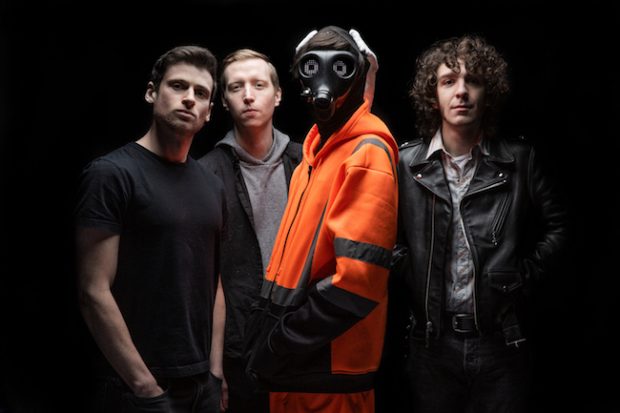
ーー今作の曲作りでは、CSHと、あなたとドラマーのアンドリュー・カッツによるプロジェクトのワン・トレイト・デンジャーとの“コラボレーション/コライト”というアプローチが取られています。今回なぜこうした初めての作り方をすることになったのでしょうか。その理由、経緯について教えてください。
CSH「これは長い間、僕の“やることリスト”に入っていたものだった。アンドリューとは4−5年一緒にバンドをやってるし、彼が自身の音楽を作ってプロデュースしているのは知っていたから。僕たちがツアーに出ると彼は自分の音楽をプロデュースして、僕たちにも加わるように促した。彼のその活動がワン・トレイト・デンジャーになった。だから僕はすでにそのプロジェクトに関わっていて、自然な流れでこのような作り方になったんだ。今回のアルバム制作を始めたときもアンドリューが関わっていて、僕とアンドリューはカー・シート・ヘッドレストとワン・トレイト・デンジャーという2つのプロジェクトを常に行き来していた。各プロジェクトのメンバーが被っていたからね」
ーー資料には、CSHによるバンドのライブ演奏と、1TDによるMIDI環境でシンセサイザーだけを使った音源を別々に録音して、それを組み合わされて制作された――とあります。具体的にはどのようなプロセスで制作は進められたのでしょうか。
CSH「ライブ演奏とシンセサイザーの演奏との間を行き来していた感じで、どちらのバージョンも完成されたものがあるというわけではない。最初は片方のやり方で始めて、僕のなかでコード進行やテンポなどの要素がある程度作られて、バンド・メンバーに紹介するものが出来たら、バンドに紹介してみんなで演奏してみる。そして時々スタジオに入って音楽をライヴで演奏したり、スタジオの方がより良く聴こえる要素に焦点を当てていった。そういう要素があればスタジオでその良さをなるべく引き出したりしたけれど、作業の多くは、シンセサイザーで作り上げた音源と、スタジオで録音したライヴ音源を組み合わせていくというものだった。制作が進むにつれて、その2つの部分を融合させていったんだ」
ーー実際に制作にあたって念頭に置いていたアイデア、重要視していたポイントはどんなことでしたか。
CSH「それは曲によって異なるね。一つの曲に対していくつかのアイデアがあり、そのアイデアをベースに曲を作っていくという作業だった。アルバム全体を通じて常に念頭にあったテーマというのは特になくて、無意識にはあると思うけれど、意識していたのは1曲につき、いくつかのアイデアを使って作曲していったということ。例えば“Can’t Cool Me Down”では、僕が何度か病気になったときのことについて歌っている。ツアー中でも病気になったことがある。そのときの、精神的にも身体的にも調子が悪い状態についての曲を書こうと思った。具合が悪くて、普段とは違ったマインドになってしまう感じ。その感じを発展させるのではなくて、その感覚にこだわってその感覚を強烈なものにしていった。だから曲にはそのアイデアが浸透している。それぞれの曲が、そういう試みとなっているよ」
ーーちなみに、CSHのオフィシャルサイトには、今作のリリースに寄せてあなたのステートメントが掲載されています。その中であなたは、もし今の時代に新しいジャンルの音楽があるとすれば、それは音楽の“新しい聴き方”と、誰もが手頃にDIYな発想でトライできる音楽の“新しい作り方”、そして何よりも音楽を愛する“新しいリスナー”によって生まれている――と述べていたのが印象的でした。それはつまり、ストリーミング・サービスやデジタル・テクノロジーの普及といった音楽を取り巻く環境の変化によって今作は生まれた、という側面もあるということでしょうか。
CSH「もちろんそう。僕のリスニング習慣はそういう変化によって変わったし、インターネットを使って音楽が聴けるようになったときから物事は大きく変わった。それまでのリスニング方法はCDで、CDは比較的高いし、音楽を幅広く集めるのが大変だった。だから最初は音楽をネットから取得するということに慣れてから、違法的に音楽をダウンロードしていた。その後、ストリーミングができたから合法に同じように音楽を聴くことができるようになって。だからストリーミングが始まってから僕はずっとその方法で音楽を聴いている。それによって音楽の聴き方が大きく変わった。アーティストから別のアーティストに簡単に(クリックして)飛べるし、新しいアーティストを発見するのも簡単になったよね。前の時代だったらアルバムに埋もれていたかもしれない曲を見つけることが今はできるし、その曲自体を評価できるから、曲から曲へと移ることも多い。そのことも今作に影響を与えている。このアルバムは、曲の一つひとつが独立していて、アルバムの一部として存在しているわけではないんだ」
ーー 一昨年、フランク・オーシャンやデス・グリップス、アウトキャストのカヴァーをライヴで披露されましたよね。そうしたあなたのヒップホップやブラック・ミュージックに寄せるシンパシーは、例えば“Hollywood”や“Deadlines”といった曲に強く感じられたのですが、いかがでしょうか。そうしたフィードバックを自覚している部分もありますか。
CSH「自覚はある。そういう音楽に興味があるから。僕はヒップホップが好きだし、最近のブラック・ミュージックにも魅力があると感じる。ブラック・ミュージックの歴史も面白い。とてもシンプルで飾りのないパワーが感じられるよ。ビートと、ラッパーがそのエネルギーをビートにのせて伝えているだけで、僕にとっては、ポップのショーみたいに華やかに作り込まれた音楽より、そういう音楽の方が魅力的に感じる。パフォーマンスやシンガー・ソングライターの面にはあまり力を入れていないような音楽。そういう感性で理解されるような曲を自分でも作れるのかやってみたかった。そういう種類の音楽を直にパクるというのではなく、自分がすでにやってきた要素と組み合わせて、そういう曲が作れるのかチャレンジしてみた」
ーー他にも、今作に良い影響を与えた、インスピレーションとなった音楽やレコードを挙げることはできますか。
CSH「スポティファイには『Making a Door Less Open』のプレイリストが既にあると思うよ
ディアンジェロ、キュアー、フリートウッド・マック、ポール・サイモン、タイラー・ザ・クリエイター、ビーチ・ハウスetc)。アルバムに関していうと、マイルス・デイヴィスの作品を何枚か愛聴していた。今作を作っているときによく聴いていたのは、『Get Up With It』と『Live-Evil』の2枚。それがどのように影響したかのかはよくわからないけど、アルバムをヴァイナルに収録することを考えるときの参考にはなった。各面に20分の制限があるということを考えながらアルバムを作るというのは、独自の芸術様式だから。このアルバム、特にヴァイナル版を作るときにはそれを意識しながら作っていた。それ以外は、個別の曲が影響になっていた。XTCの“Making Plans For Nigel”はプレイリストの1曲目に入っているし、ドゥーワップもよく聴いていてディオン・アンド・ザ・ベルモンツの影響もアルバムのところどころに埋められている。とにかく様々な音楽を聴いて、制作時に聴いていた音楽ならなんでも受け入れて、良い部分は自分の作品にも取り込もうとした」
ーーちなみに、あなたは今作の資料のなかで「それらの楽曲の根底にあるのはフォーク・ソングかもしれない。なぜなら、この曲たちは多数の違った方法で演奏したり歌ったりすることができるから」とも述べていますよね。つまり、今作の楽曲は今後、アレンジや編成を変えた形でライヴで披露されたり、あるいは別バージョンで録音して作品という形でリリースする可能性もあるということなのでしょうか。
CSH「その可能性はあるね。実際、今僕はアルバムの曲をアコースティック・ギターで練習していて、ライブでも演奏できるようにアレンジしているところなんだ。今は家から出れない状況だからその様子をライブ配信しようかとも考えている。このアルバムの目的の一つとして、アコースティック・ギター1本でアルバムを通して演奏できるようになる、というのがあった。曲を元のバージョンではないものに変えて、それでも良い曲だと思わせることができれば、それは良い曲だと思うから。今回のスタジオ・バージョンのアルバムは、今作の1つのバージョンに過ぎなくて。それはもちろん僕が気に入っているバージョンで、僕たちが時間をかけて仕上げたバージョンで、そのバージョンでリリースされたものだけれど、それ以外のライブ・バージョンや、今後は別の録音バージョンもあるかもしれない。なんでも可能なんだ」
ーー「Making a Door Less Open(※ドアを開けにくい状態にする)」というアルバム・タイトルにはどんな意味が込められているのでしょうか。
CSH「タイトルは曖昧さを意図して付けられている。バンド名のカー・シート・ヘッドレストのように、直でその意味が解釈されるようなタイトルにはしたくなかった。少しミステリアスで、人々が音楽を聴きたくなるようなものにしたかった。その一方で、ある意味の親密さを表現したかった。部屋に人が何人かいて、部屋の扉を閉めて、その部屋にいる人たちとの時間を特別なものにする、というイメージ」
ーーCSHは今年でデビュー&結成10年になります。振り返ってみて、この10年の経験は今の自分にどうフィーバックされていると思いますか。
CSH「カー・シート・ヘッドレストをやっていて、人生一生分の経験した感じがする。僕がバンドを始めたときは高校生で、その後大学へ進んだけど、その間もたくさんの音楽を録音してきた。大学を辞めて、〈Matador〉と契約を結び、音楽制作を続けた。僕にとって、その期間は想像を絶する以上に長い時間だったよ。でも今それを振り返って、僕が今まで作ってきた音楽を振り返ると、初期の自分やそれ以前の自分との繋がりを今でも感じる。僕は色々な意味であまり変わっていないし、世界もあまり変わっていないのかもしれない。変わったものも確かにあるけれど、僕が目指しているものは変わっていないし、僕は音楽を作り続けていきたい。この10年間について考えると、それが重要なところだと思う。今でも音楽をやりたいという気持ちは変わらないし、自分がこれまでに達成したことを誇りに思っている。カー・シート・ヘッドレストを始めたときも同じような気持ちだった。自分が音楽を作れるということに自信を感じていて、それを世界に証明したくてこのプロジェクトを始めたから」
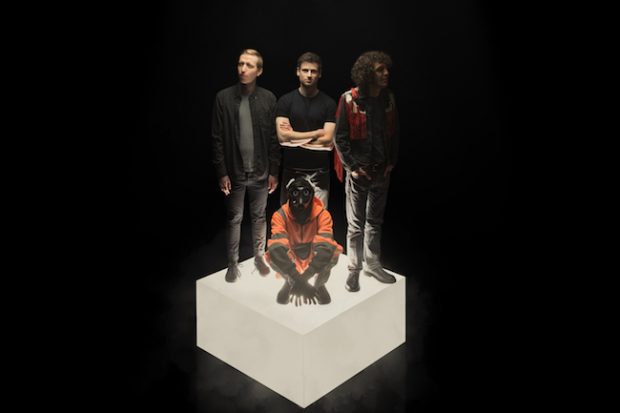
text Junosuke Amai
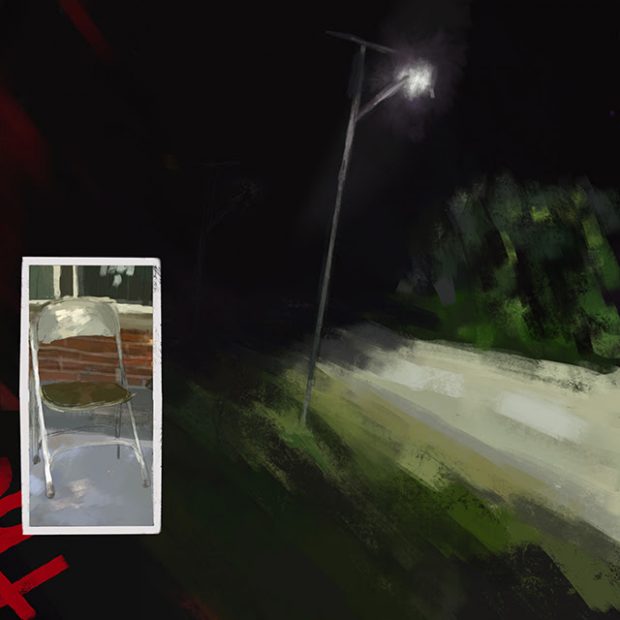
Car Seat Headrest
『Making A Door Less Open』
(Matador / Beat Records)
2020/05/01 FRI ON SALE
国内盤CD ¥2,200+税
国内盤特典: 歌詞対訳・解説書封入
BEATINK.COM:
http://www.beatink.com/products/detail.php?product_id=10884
Amazon: https://www.amazon.co.jp/dp/B0857CYYV5
TRACKLISTING
01. Weightlifters
02. Can’t Cool Me Down
03. Hollywood
04. Martin
05. Hymn (Remix)
06. There Must Be More Than Blood
07. Deadlines
08. What’s With You Lately
09. Life Worth Missing
10. Famous
11. Deadlines (Alternate Acoustic) [CD-Only Bonus Track]
12. Hollywood (Acoustic) [CD-Only Bonus Track]
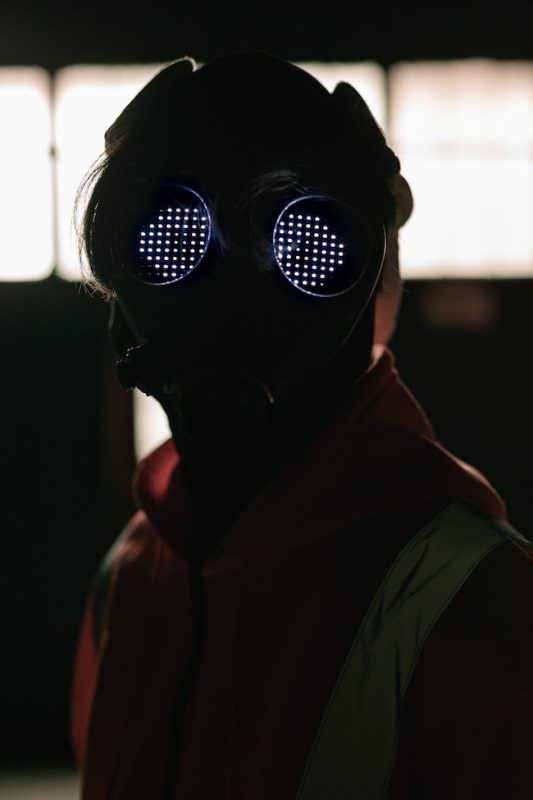
- How are you spending your time these days? Can you tell us something that you enjoy doing or supporting you and things that are going through your mind lately?
CSH: I’ve been trying to keep busy. I jumped right into trying to work on another project and I’ve been making music with my roommate. So I started to put together more pieces on that. I’ve got a pile of books in my living room that are half read. So I have been spending as much time as I can, going through those. Just keeping notes to myself, writing thoughts down as they occur. I feel like it is easy to lose track of time of what you are doing day to day so I kind of want a document of what I am thinking. Random ideas or whatever is occupying my thoughts, I try to write it down. Kind of a new thing, but I am trying it out.
-Your new album comes out in May. How do you feel right now?
CSH: I’m feeling good. We are pretty close now. I feel like a lot of the rockier passages have been cleared and we finally got it down and submitted. Our merch person just got hold of the vinyl today so she can start shipping stuff out soon. We are excited about that. I think more songs are going to come out and hopefully more people talking about it and listening to it. I am looking forward to the whole thing rolling out.
-Your records up until now were about complicated emotions and life events during adolescence, which were sung through dramatic storytelling and honest psychological descriptions. On the other hand, the album sings about unfortunate things like war and blood bleeding. I got the impression that you were conveying themes such as struggle, savior, death and regret through these things. Why do you think this style of your record changed this time?
CSH: I think my music has always had a dark side to it. I definitely was writing plenty about death earlier on. But I think it becomes more of a reality as I get older and I start thinking about it more seriously. I had a time of my life where I felt like I was younger than plenty of other people but not I’m inherently young anymore. I am past the stage where people say that I am too young to be doing this stuff and into the phase where I am just a normal person doing it like the rest of them. Coming to terms with that, is a lot of what the album is about.
-On the song ‘hymn’, the lyrics “my life marooned on trivial pursuits, If I give this up will I be saved? Will my life be spared, what will take its place.” sung desperately, leaves a strong impression. Can you tell us how this song came about?
CSH: It was a very quick song. The quickest on the record that came about and we had been in the studio getting pretty stressed out about things. We had most of the record there but we had missing pieces that we were trying to fit in. We weren’t getting anywhere with it and in the midst of that, crescendoing into a panic about it. I ended up pulling that song together in about a day or so. It captured the desperation that I was feeling at the time.
-The song ‘famous’, that seeks help singing “I need a break, I need a life that’s right. I need to wait.” also touches my heart. Can you tell us how this song was made?
CSH: That one was pieced together over a longer stretch of time but trying to keep a stream of consciousness and feel to it. The music came first and it was very chaotic and had these weird vocal samples throughout my own vocals. It felt like a very raw song musically so I wanted to capture that lyrically as well. Whatever I was
feeling that way or feeling like I can channel that emotion. I tried to write short little lines for the song that kept up this feeling of isolation, loneliness and desperation. It ended up still being a pretty simple and concise song but with thoughts that roam all over the place.

-I’d like to ask about the sound of this record. This was a collaboration between Car Seat Headrest and 1 Trait Danger which was a project by you and drummer Andrew Katz. Can you tell us why you decided to make the record with this new approach?
CSH: It was on my to-do list for a while. I had been playing with Andrew for four or five years now. I always knew that he was making his own music and producing his own stuff. When we went on tour, he would produce stuff and incorporate us into it and what he was working on became 1 Trait Danger. I was already involved in that so it was natural for me, when we were putting stuff together for this record, he would be involved in that and we would be going back and forth between the two projects. The personnel was the same between both of them.
-On the press release, it says that the band recorded the album twice. Once live with the band and once as 1 Trait Danger in a midi environment using purely synthesized sounds. Can you tell us the specific process of how you did this?
CSH: We went back and forth. There is no fully complete version of either end of it. There is no completely live version or synthed version. It was just starting it off on one leg and once it gathered enough material, if it had a chord progression or a tempo, some sort of structure that I could pass along to the band, I would take it to the band, and we would play it. Periodically, we would be going into the studio to play stuff live and really try to focus on what sounded best or better in the studio. See if we could pull anything to pull it, but ended up combining everything between the synths build up project and what we were recording live in the studio. We were adding stuff together as we went.
-What were some of the ideas, images and important things that you had in mind when actually making this record?
CSH: It definitely varied song to song. I would get a couple of ideas for each song and would want to build around that. I didn't have themes that I was consciously passing throughout the album. I think that always happens on an unconscious level. Consciously, I would just be working with a few ideas per song. On ‘Can’t Cool Me Down’ for example, I’d been sick a few times and sick on tour. I started getting this idea of putting this song together that was about being ill, mentally or physically and being in a different state of mind. I wanted to not expand it from there but intensify it so the entire song is pervaded with that idea. So each song is an attempt to do that.
-On your official website, there is a statement that you wrote about this record. “If there is a new genre emerging in our times, it will come from new ways of listening to all types of music, of methods of creating music at an unprecedented level of affordability and personal freedom of new audiences to embrace the works.” That part stuck with me. Does that mean this album came out of such change in the environment of surrounding music such as streaming services and how digital technology became widespread?
CSH: For sure. My listening habits change based on that. As soon as the internet really offered a way to listen to music, that was where I was because the alternative at the time were CDs which were more expensive and harder to get a wide collection of music going. First I got used to getting music online and illegally downloading stuff but then once streaming came along, it basically provided a legal option to do the same thing. So I have been doing that since streaming started getting its ground. It definitely changed the way we listen to things. It is a lot easier to jump from artist to artist, to discover artists and find individual songs that might have been buried in an album somewhere in previous eras that can get unearthed in its own right. I was definitely hopping from song to song and I think that influenced how I was thinking about the album and the songs as individual units instead of in album context.
-Two years ago, you covered Frank Ocean, Death Grips and Outkast at your shows. I can hear how you are influenced by hiphop music and black music from songs such as ‘Hollywood’ and ‘Deadlines’. Are you consciously playing off these influences of hip hop and black music onto these songs?
CSR: I am conscious of it. It is interesting music and I listen to a lot of hip hop and the modern stuff that is going on right now has an appeal to it and sort of the history of it as well. It has got a very simple, unadorned power to it where it is just the beat and the rapper over that beat, conveying the energy. To me, that is a lot more appealing than something that is really built up into a pop spectacle but doesn’t have so much weight to it on the performance side or singer/songwriter side. I wanted to challenge myself to create songs that worked on that level. Hopefully not directly ripping off that type of music but incorporating elements of it, into what I was already doing.
-Can you tell us some other music or records that became influences or inspirations for this album? If you were to release a playlist along with this album, what kind of songs would you choose?
CSH: I think there is a playlist on spotify. In terms of albums I fell in love with a couple of Miles Davis records making this one. I listened a lot to ‘Get up with it’ and ‘Live-Evil’. They definitely influenced the process of putting this on vinyl because it is a different art; getting to understand a twenty minute side limit and crafting a record around that. So I was conscious of that, making it especially for vinyl. Other than that, it was a bunch of little stuff like making plans for Nigel and XTC is on the top of that playlist. I was listening to a lot of Doo-wop as well. There was a lot of Dion and the Belmonts influence under the record. Whatever I was exposed to at the time, I was trying to be open to and include whatever was good about it in my own work.
-On the press release you said that “Underneath all of these things, these may be folk songs because they can be played and sung in many different ways.” Is there a chance that these songs on this album might be arranged and played live or recorded in different versions and released in the future?
CSH: Yeah, that is possible. I am actually preparing right now. Trying to practice on acoustic guitar and rearranging these songs so I can play them live. Since we are all stuck inside I might live stream stuff. But yes, that was one of my goals for this record so that if I wanted to, I could just pick up an acoustic guitar and play it all the way through. I think that is a mark of how strong the song is. If you can take it out of its original context and still make it work. I kind of see these studio versions and this album as sort of one rendition of the songs. They are renditions that I like because I spent so much time on them and we are releasing in that way. But there will definitely be alternative live versions and maybe alternative recorded versions eventually. Anything is possible.
-What is the message behind the title 'Making a Door Less Open’ ?
CSH: In a way, it is meant to be ambiguous. Like the name Car Seat Headrest, I think I didn’t invite interpretation off the bat. I wanted something that could be a little mysterious and sort of invite people to listen to the music. I also see it as a level of intimacy where the people inside the room and you can close the door and you can have a special time with whoever is inside of the room.
-This year marks the ten year anniversary for Car Seat Headrest since the band was formed and made its debut. Looking back, how have these past ten years reflected on yourself now?
CSH: I feel like I have lived a lifetime. I was in high school when that started and I went through college, recorded a bunch of music, left college, got signed with Matador and continued to make music. That stretch of time feels unimaginably long to me. At the same time, when I look at the music that I had made, I definitely see a connection right back from the start. Even earlier, I feel like in a lot of ways I have not changed that much and maybe the world hasn’t changed that much either. There are things that changed but my goals haven’t changed and I still want to make music and that feels significant to me. When I think about the span of ten years, I still want to do the same things that I did and I am still proud of what I have accomplished. At the time as well when I started Car Seat Headrest. I already felt pretty good about where I was as someone who could make music and I wanted to prove that to the world when I started this project.

text Junosuke Amai

Car Seat Headrest
『Making A Door Less Open』
(Matador / Beat Records)
2020/05/01 FRI ON SALE
¥2,200+税
BEATINK.COM:
http://www.beatink.com/products/detail.php?product_id=10884
Amazon: https://www.amazon.co.jp/dp/B0857CYYV5
TRACKLISTING
01. Weightlifters
02. Can’t Cool Me Down
03. Hollywood
04. Martin
05. Hymn (Remix)
06. There Must Be More Than Blood
07. Deadlines
08. What’s With You Lately
09. Life Worth Missing
10. Famous
11. Deadlines (Alternate Acoustic) [CD-Only Bonus Track]
12. Hollywood (Acoustic) [CD-Only Bonus Track]
関連記事のまとめはこちら
https://www.neol.jp/music-2/
この記事に関連するニュース
-
石橋英子、2025年3月28日にDrag Cityより歌のニュー・アルバム”Antigone”をリリース。第一弾シングル”Coma”を配信開始。
PR TIMES / 2025年1月10日 13時40分
-
UESHIMA MUSEUM ANNEX 今津景展 チケット販売開始のお知らせ
PR TIMES / 2025年1月7日 10時0分
-
UESHIMA MUSEUM ANNEX オープンのお知らせ ~ 2025年1月15日より、今津景展を開催
PR TIMES / 2024年12月23日 15時15分
-
Shareholder Proposals to Japan Business Systems, Inc.
PR TIMES / 2024年12月22日 14時40分
-
【愛しとーと】国際機関ESQRの品質優秀ダイヤモンド賞「Quality Choice Prize 2024」を受賞!
PR TIMES / 2024年12月20日 13時45分
ランキング
-
1「友達がいない」「こだわりが強い」結婚できなかった37歳男性、それでも“親友のような妻”と出会えたワケ
日刊SPA! / 2025年1月16日 8時54分
-
2不二家、コージーコーナーも苦戦…街からケーキ屋が減っているワケ
日刊ゲンダイDIGITAL / 2025年1月16日 9時26分
-
3「実家じまい」を考え始めたら - 進め方は? いくらかかるのか費用の目安も解説
マイナビニュース / 2025年1月16日 11時25分
-
4朝の満員電車で、大声で電話する男性にイライラ…「静かにしてもらえませんか?」と注意したら“まさかの行動”に
日刊SPA! / 2025年1月16日 8時52分
-
5妹の結婚相手は“誠実そうな男”だったのに…「泣きながら逃げてきた」妹が明かした恐ろしい素顔
日刊SPA! / 2025年1月15日 15時52分
記事ミッション中・・・
記事にリアクションする
![]()
記事ミッション中・・・
記事にリアクションする

エラーが発生しました
ページを再読み込みして
ください



